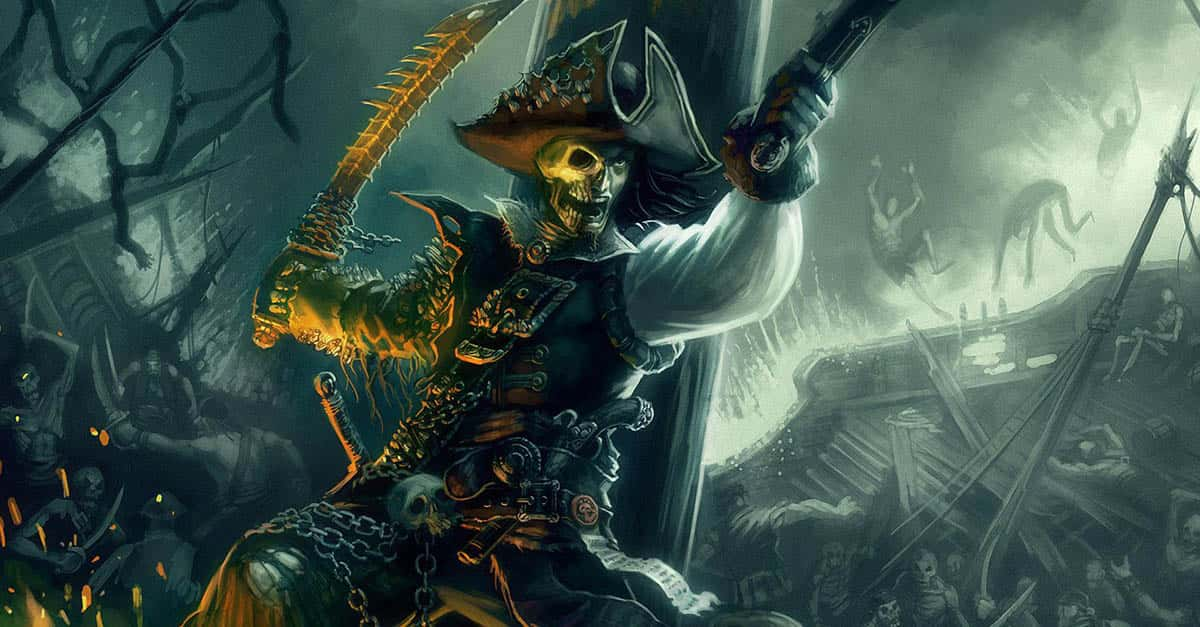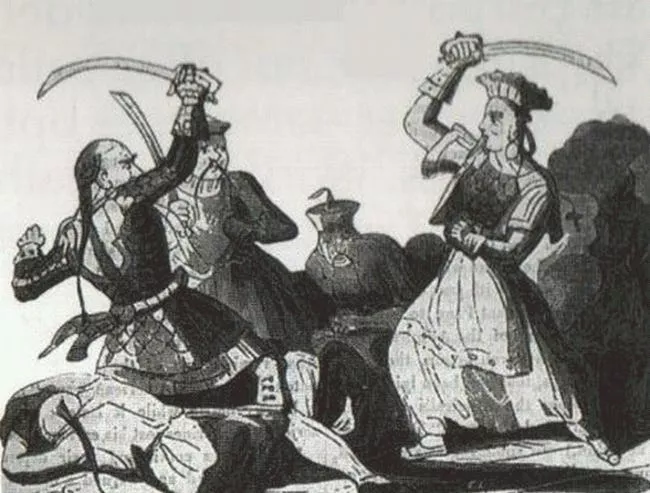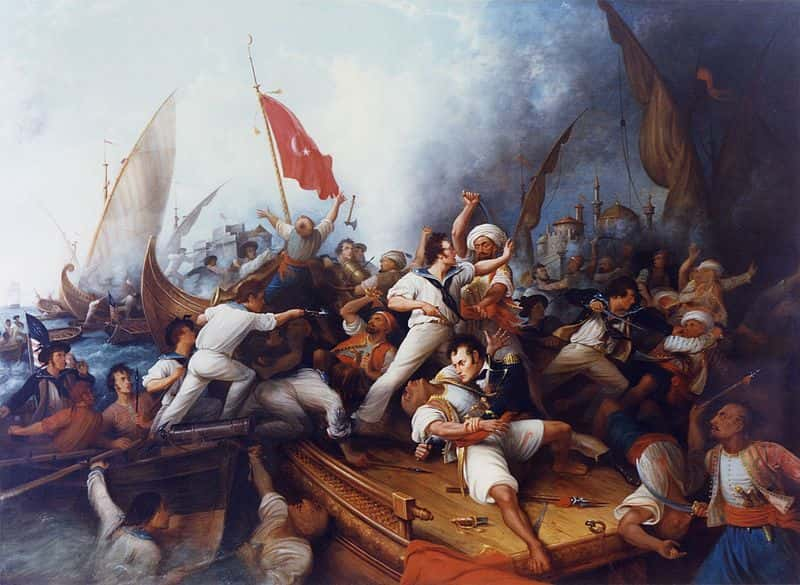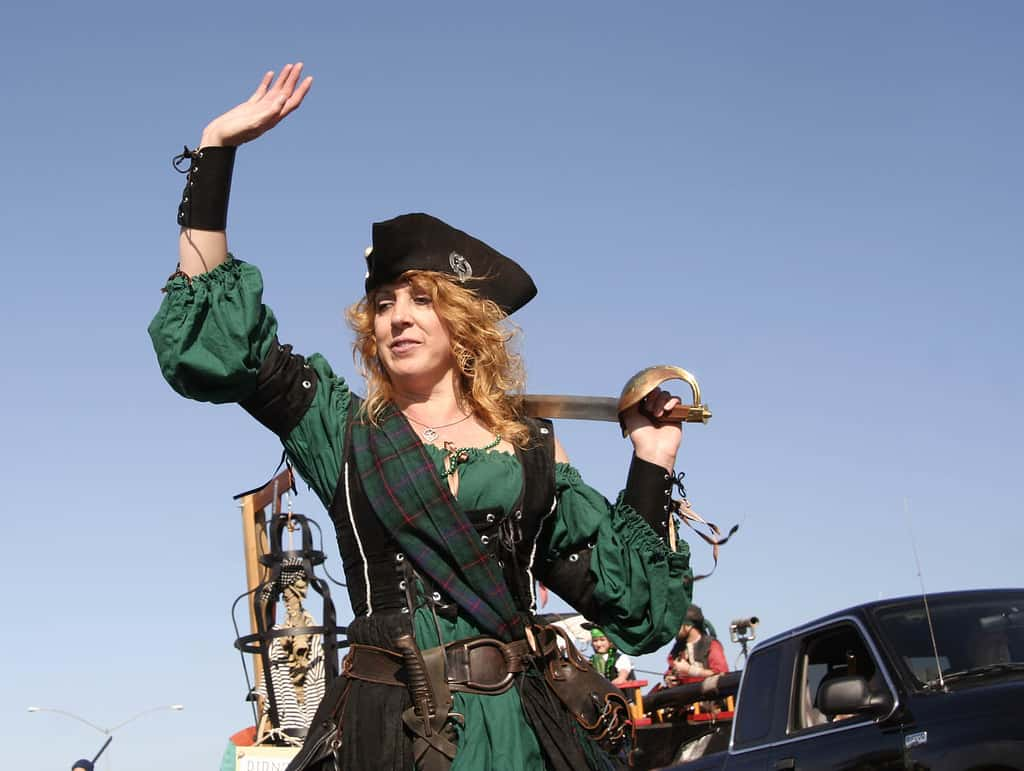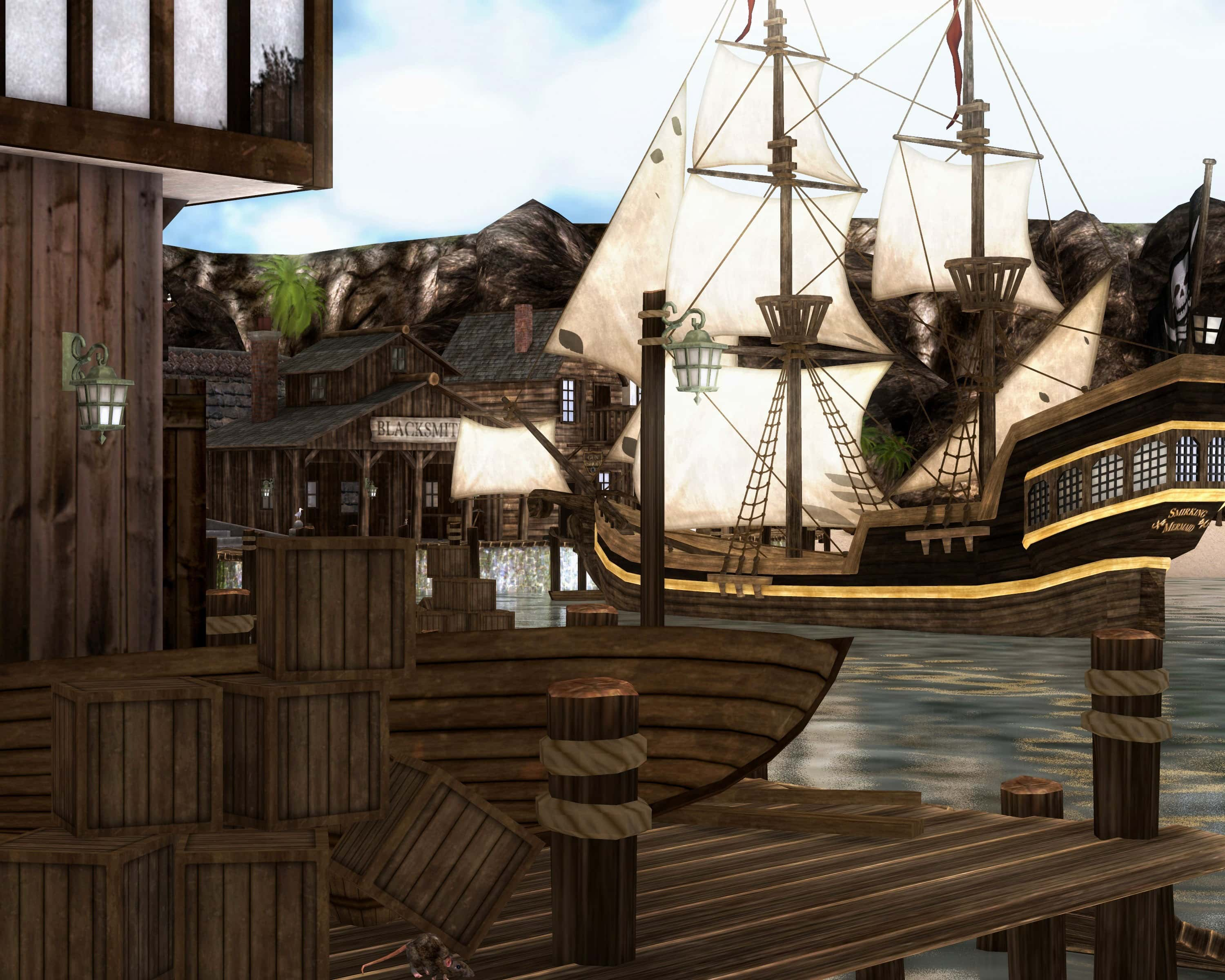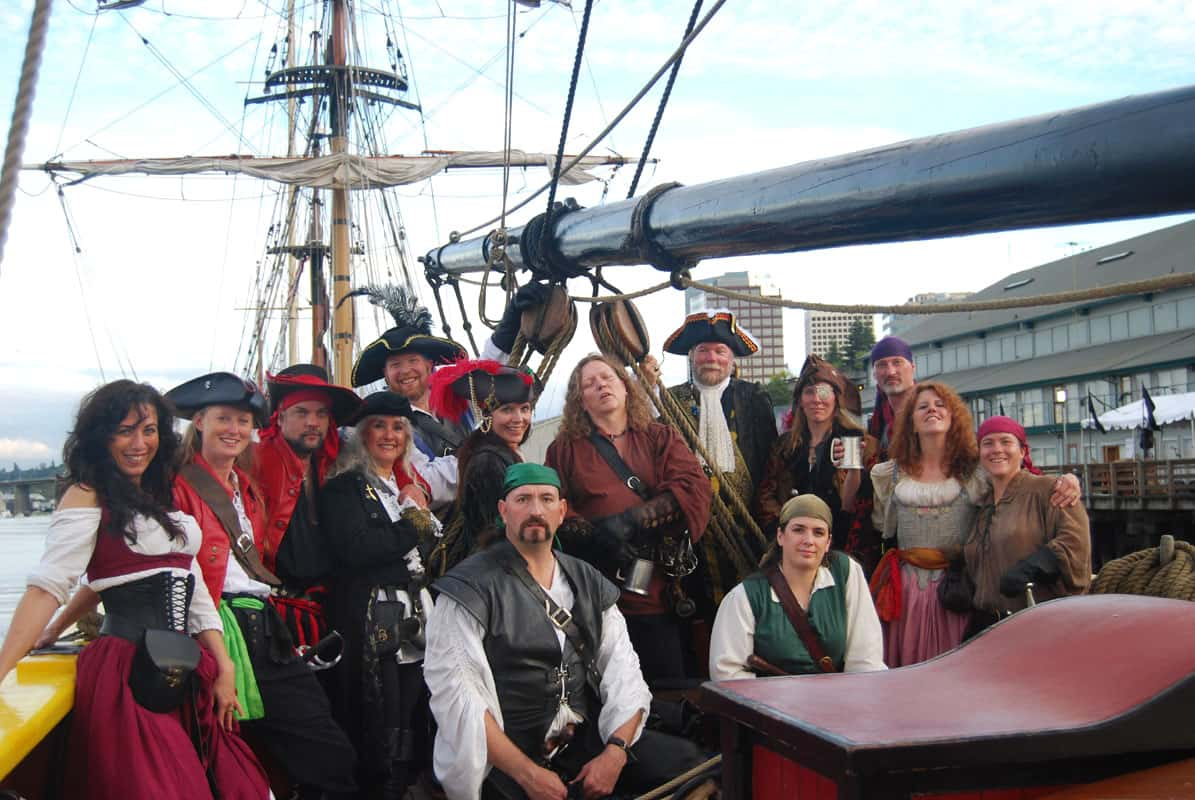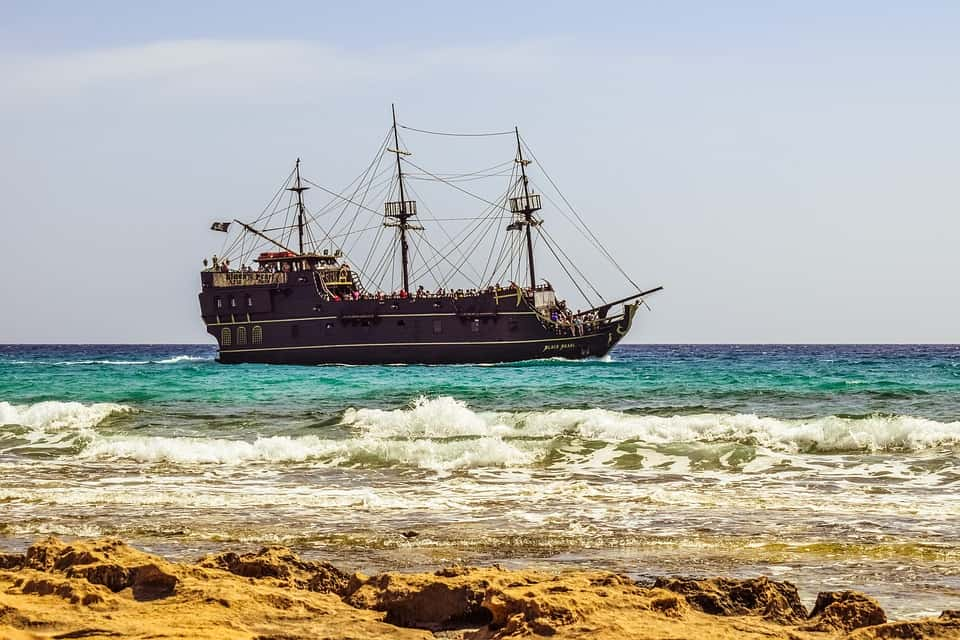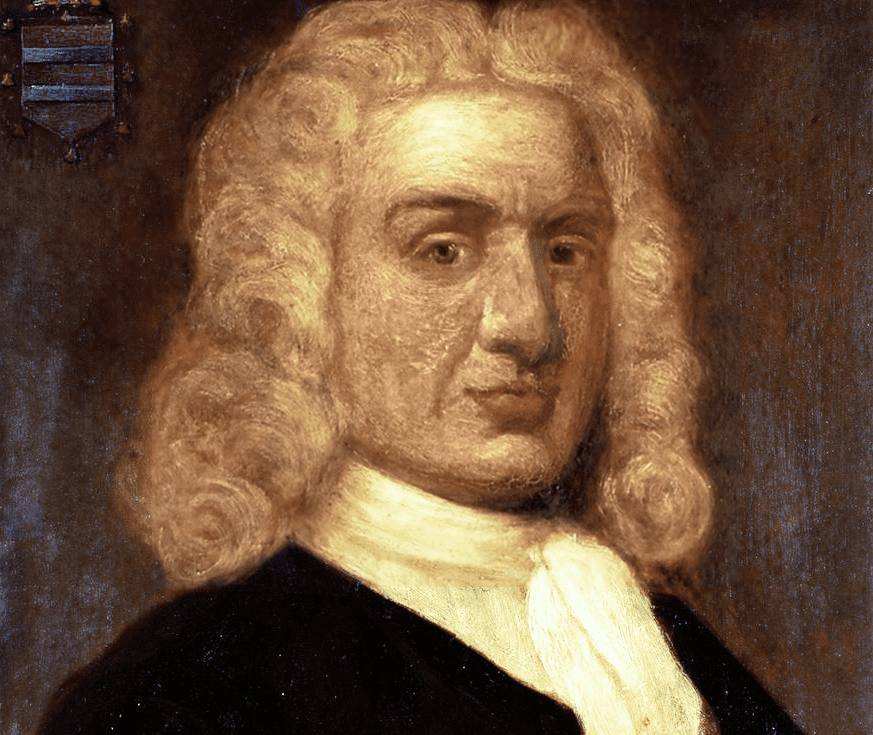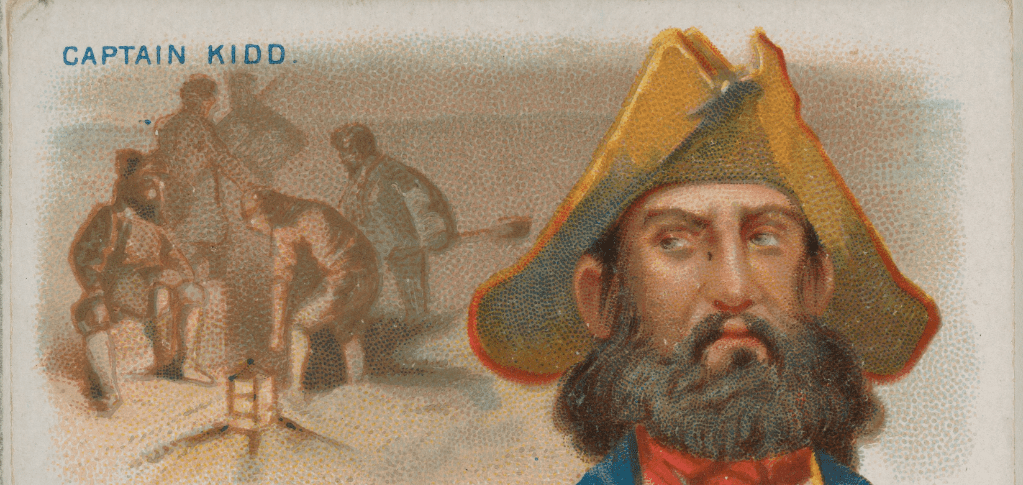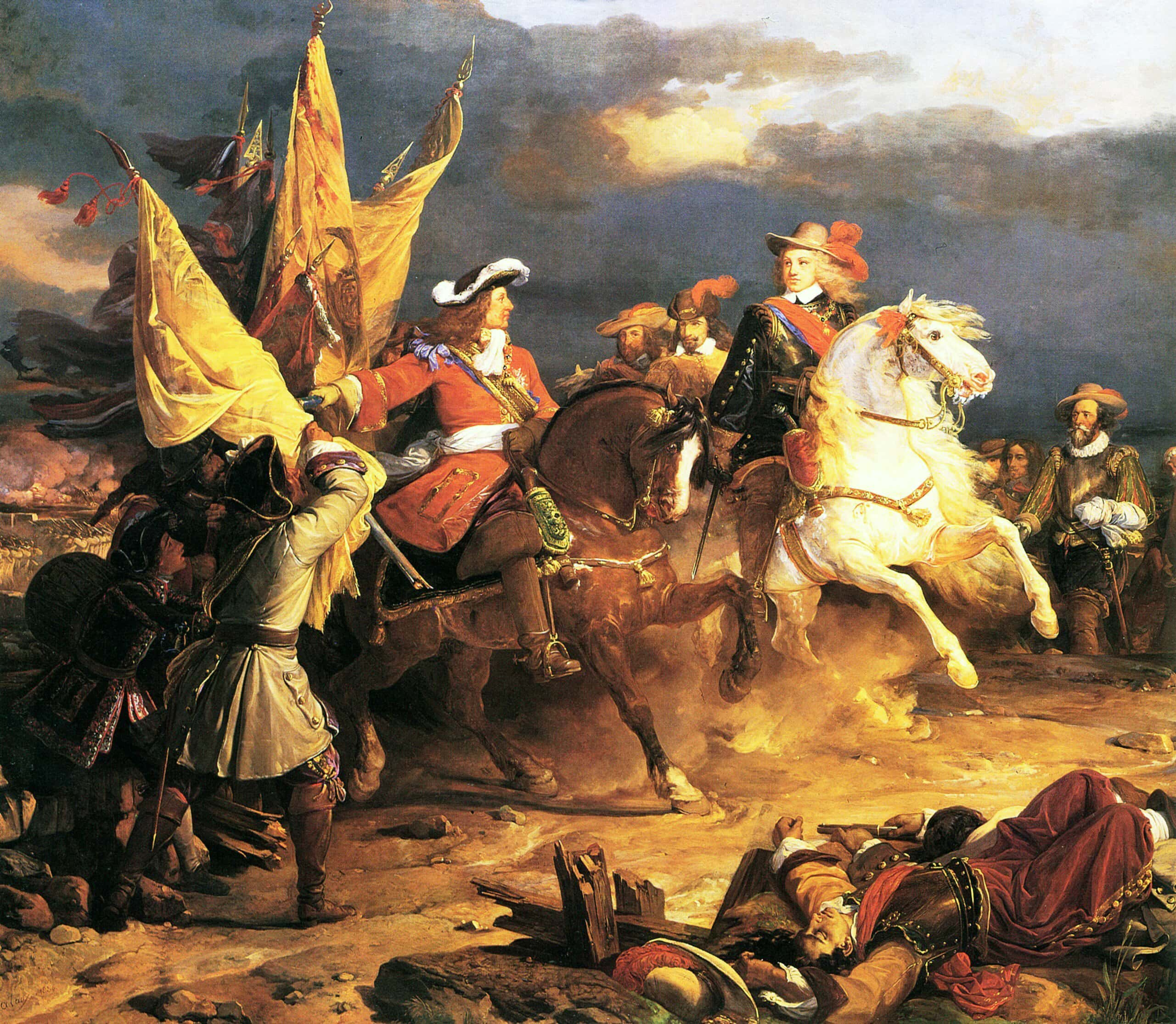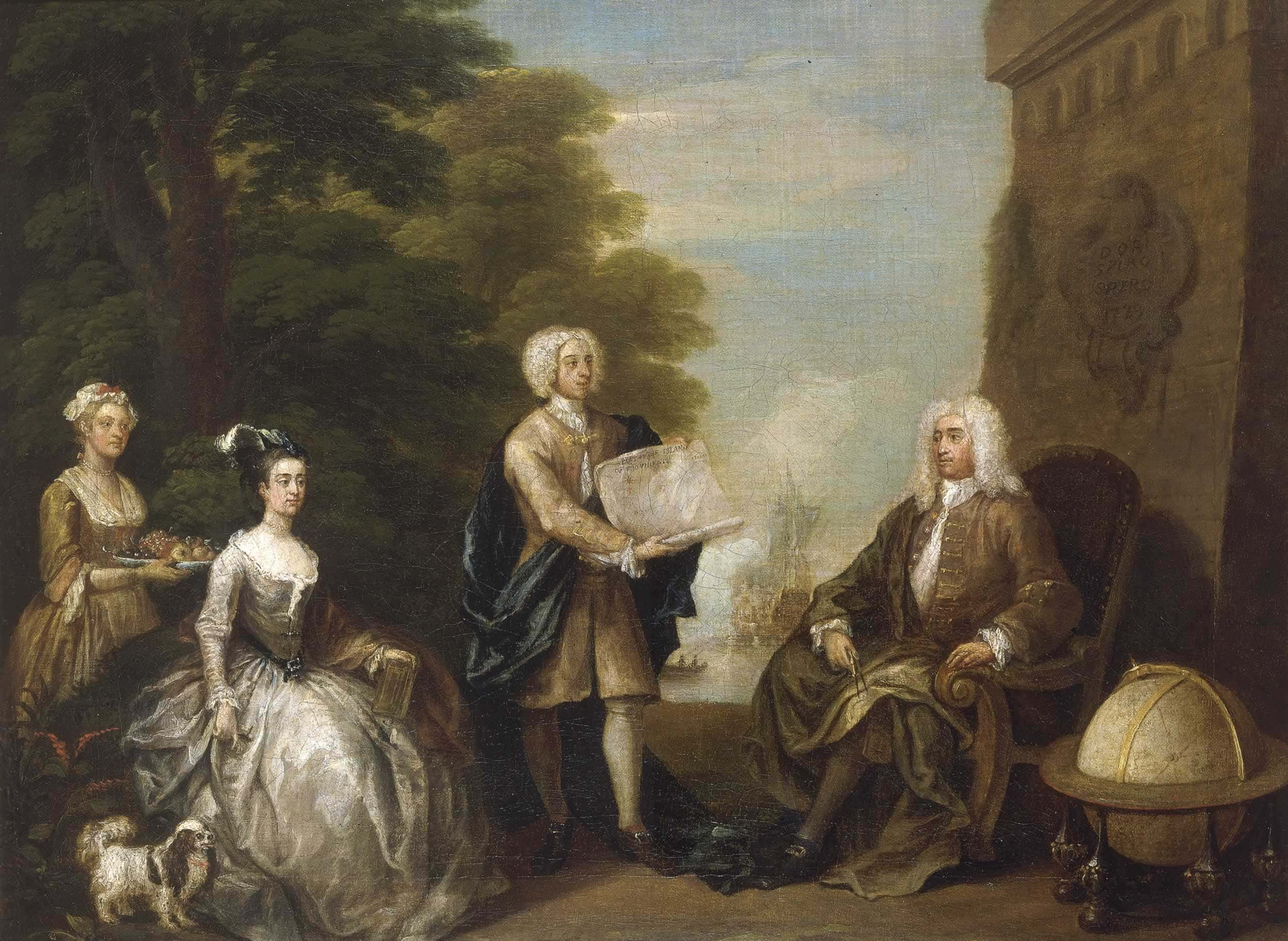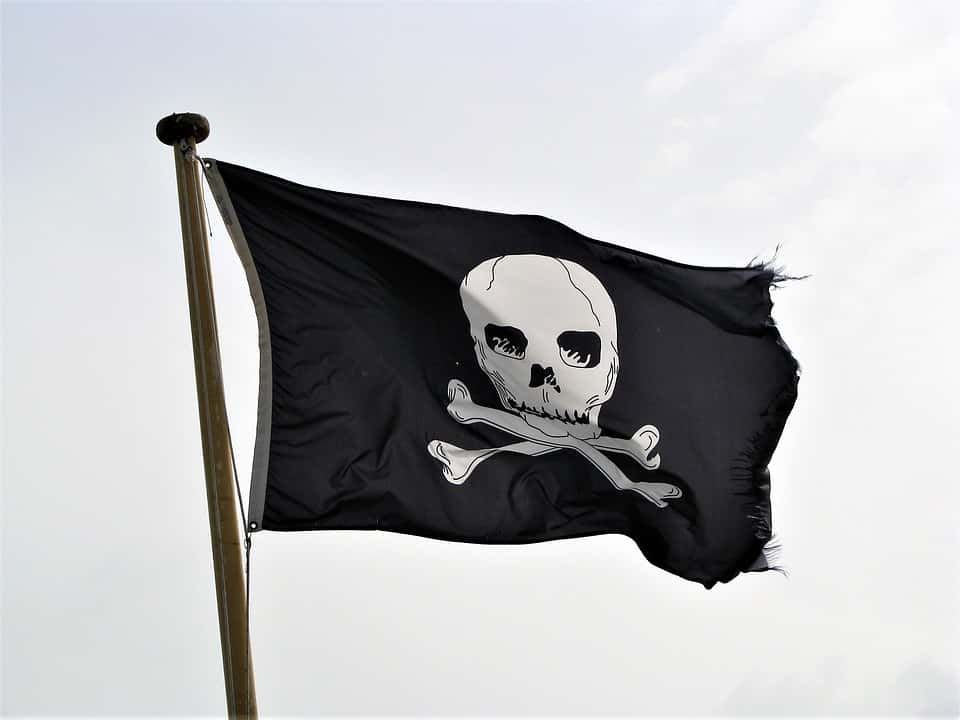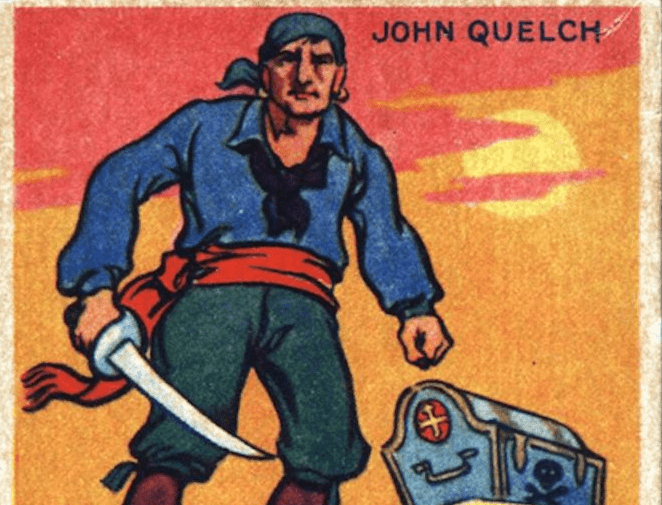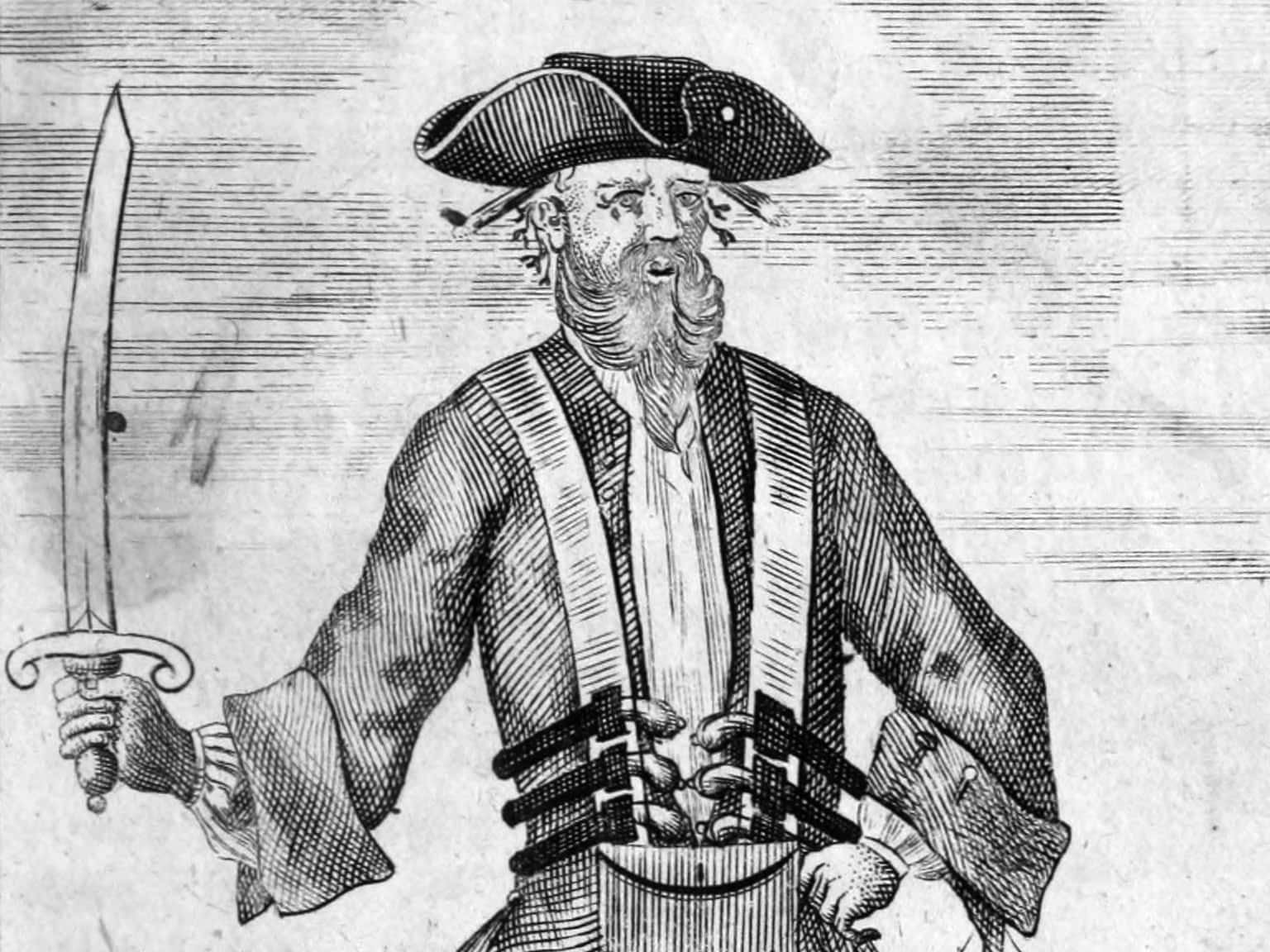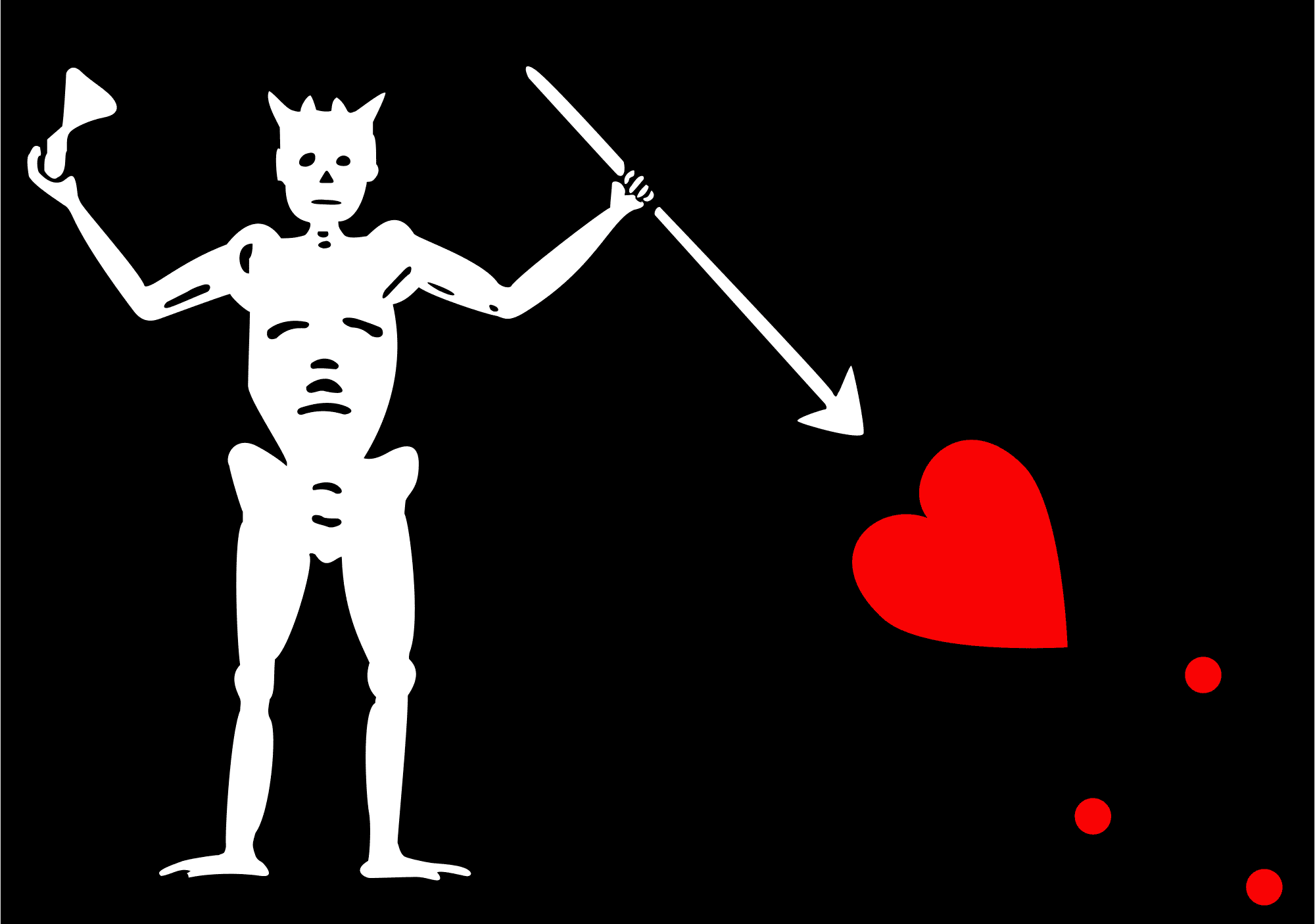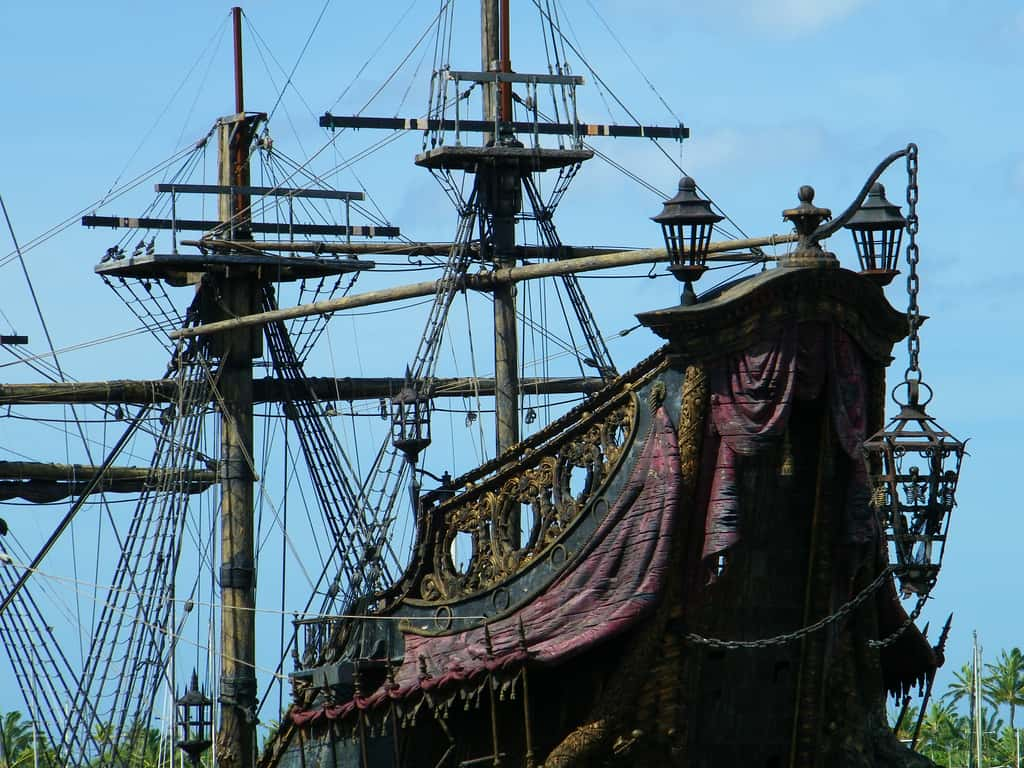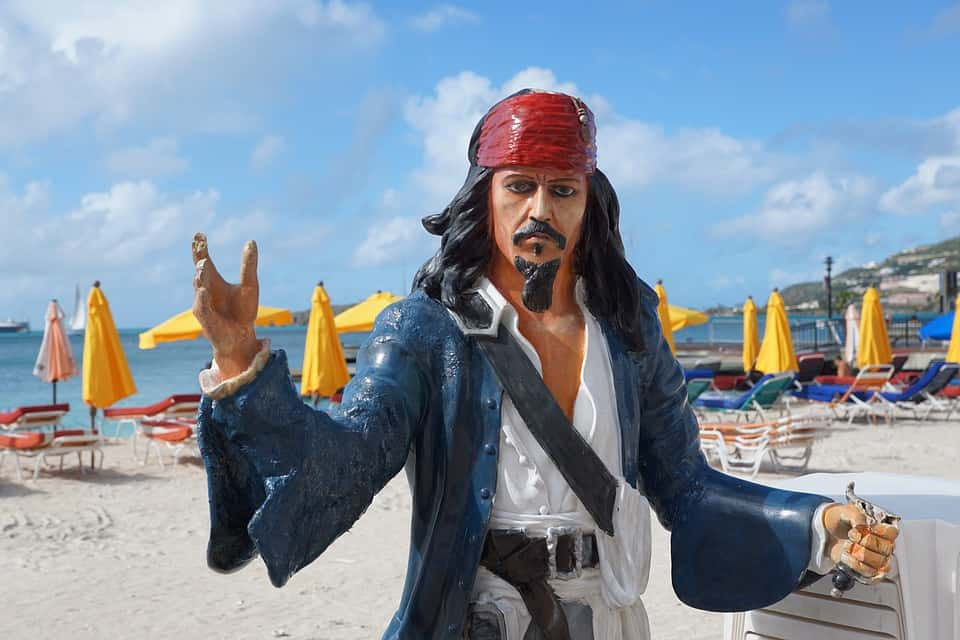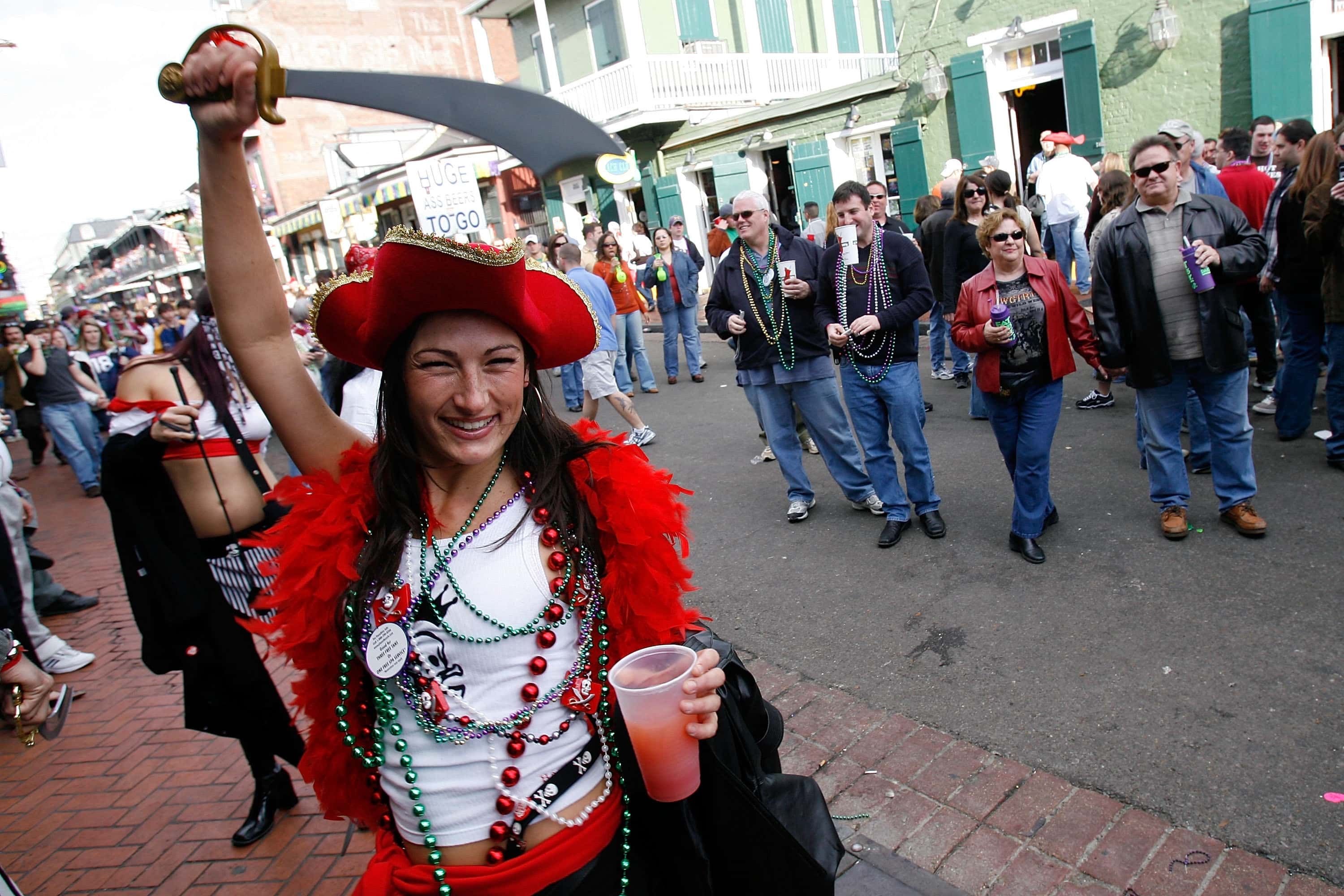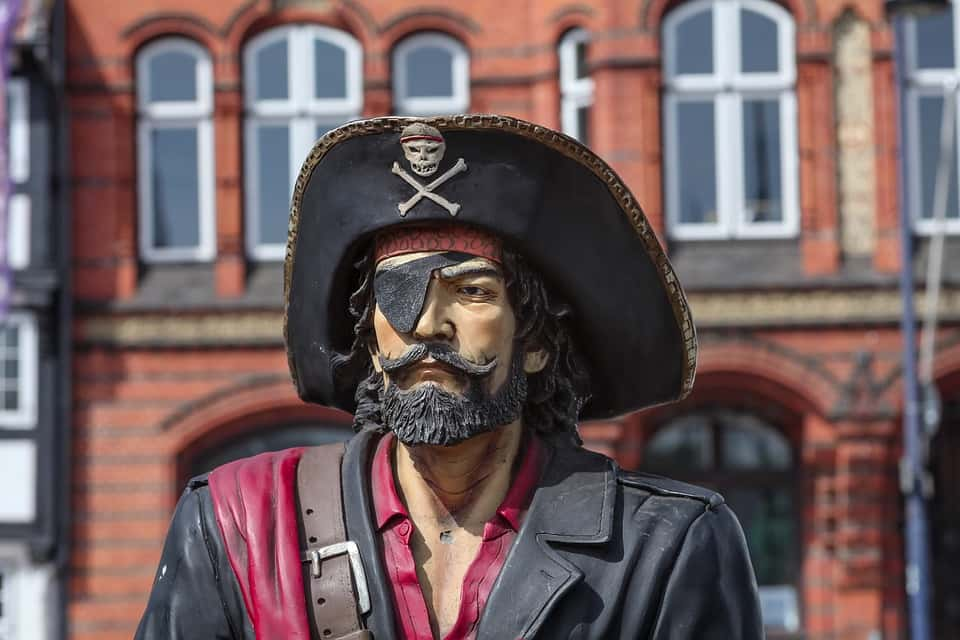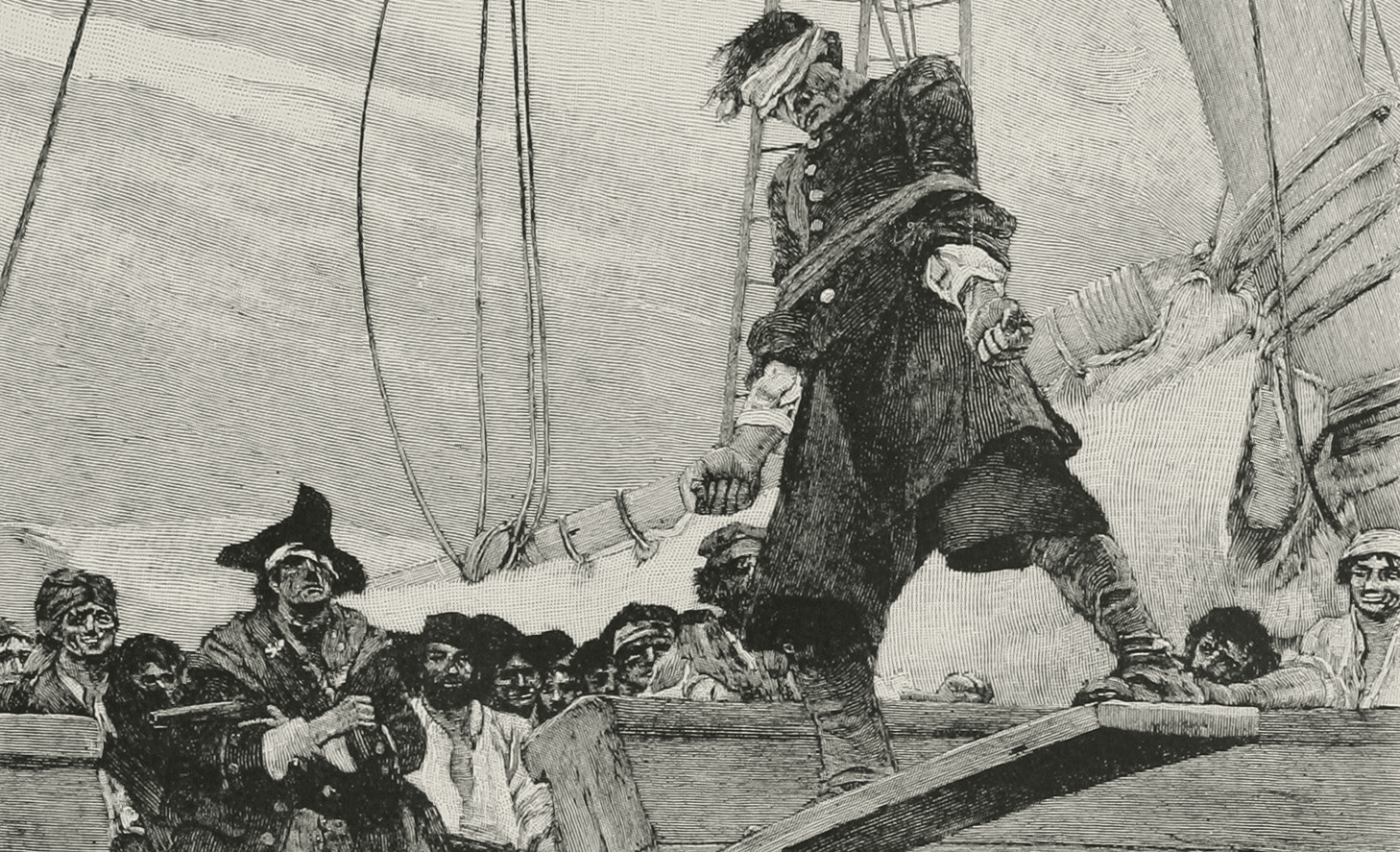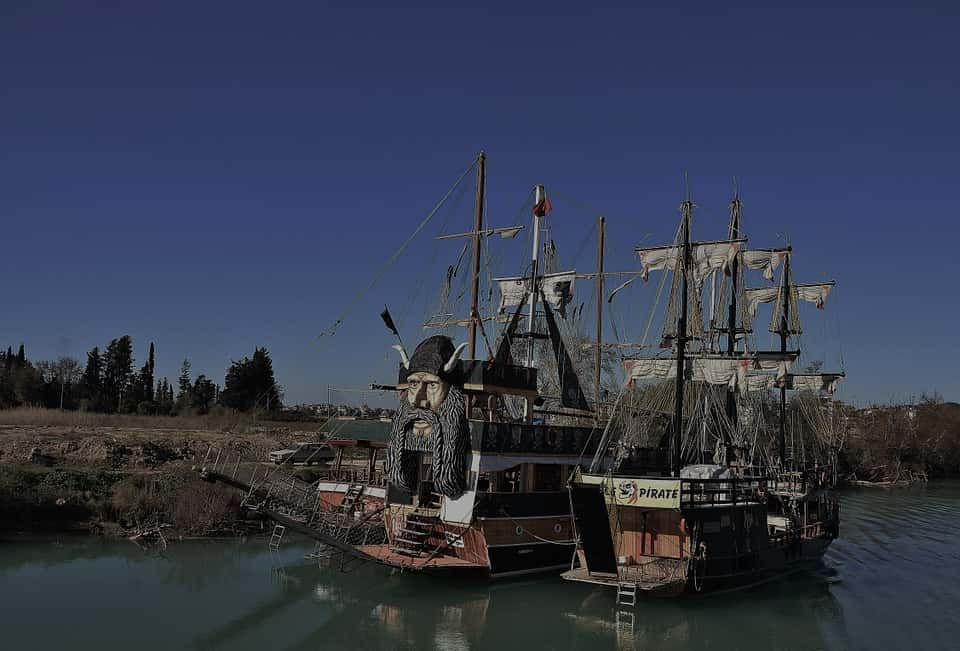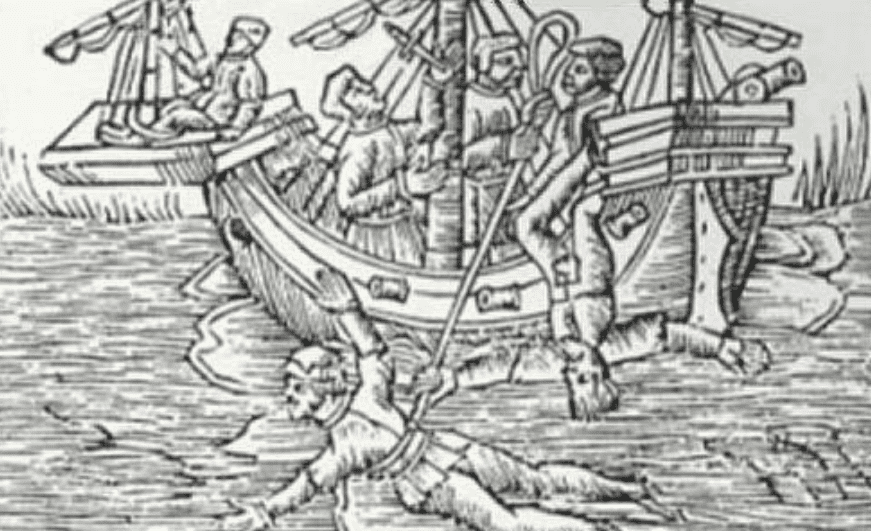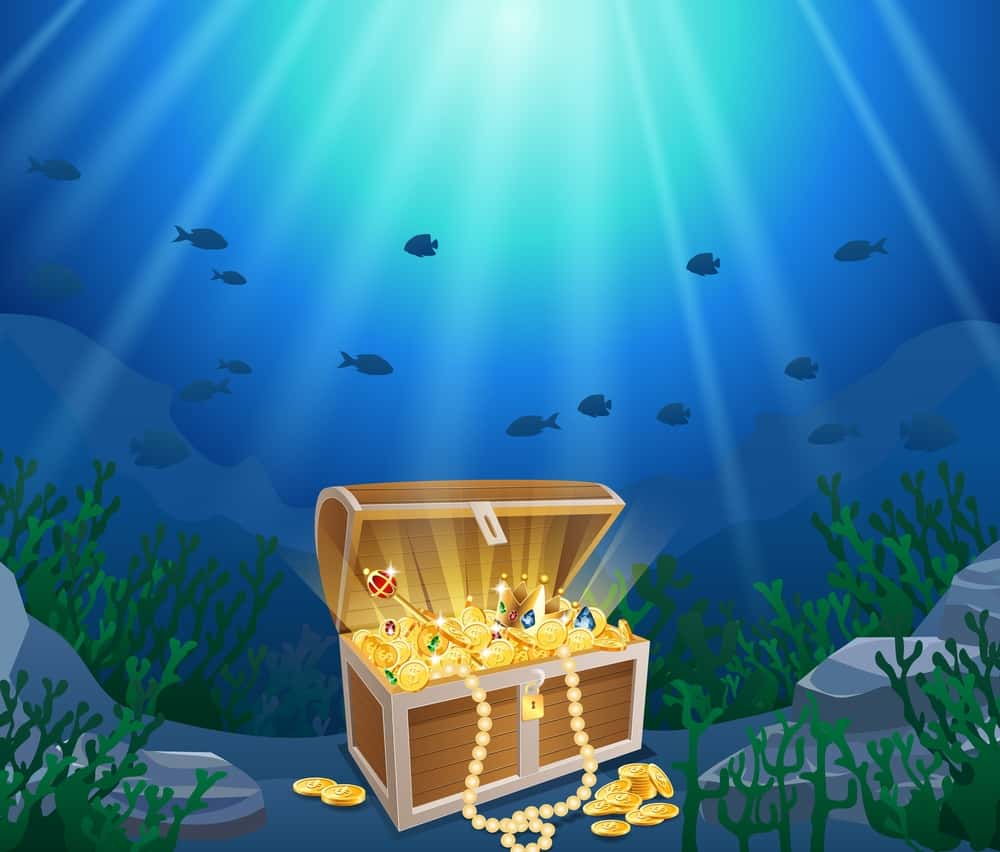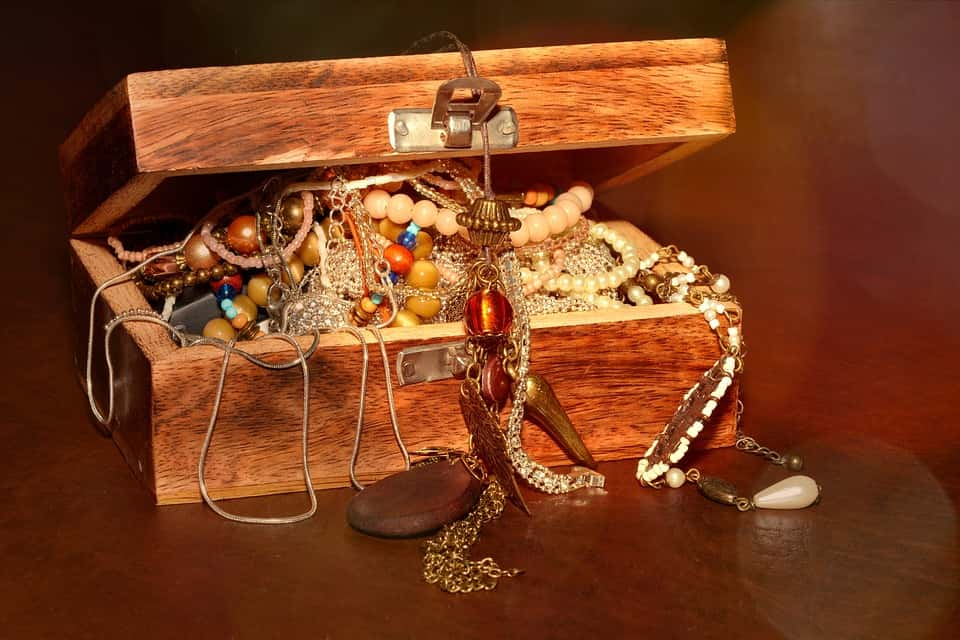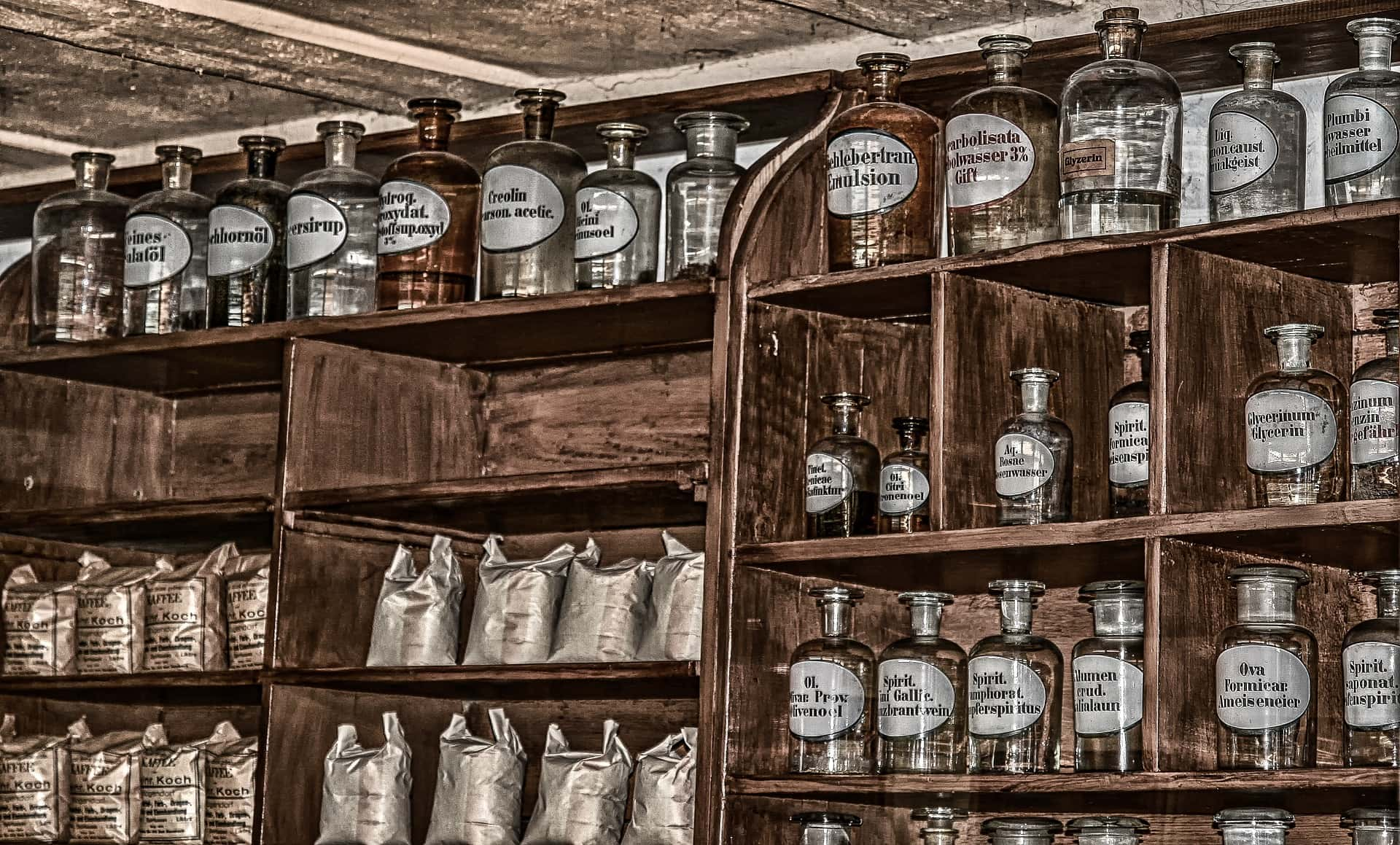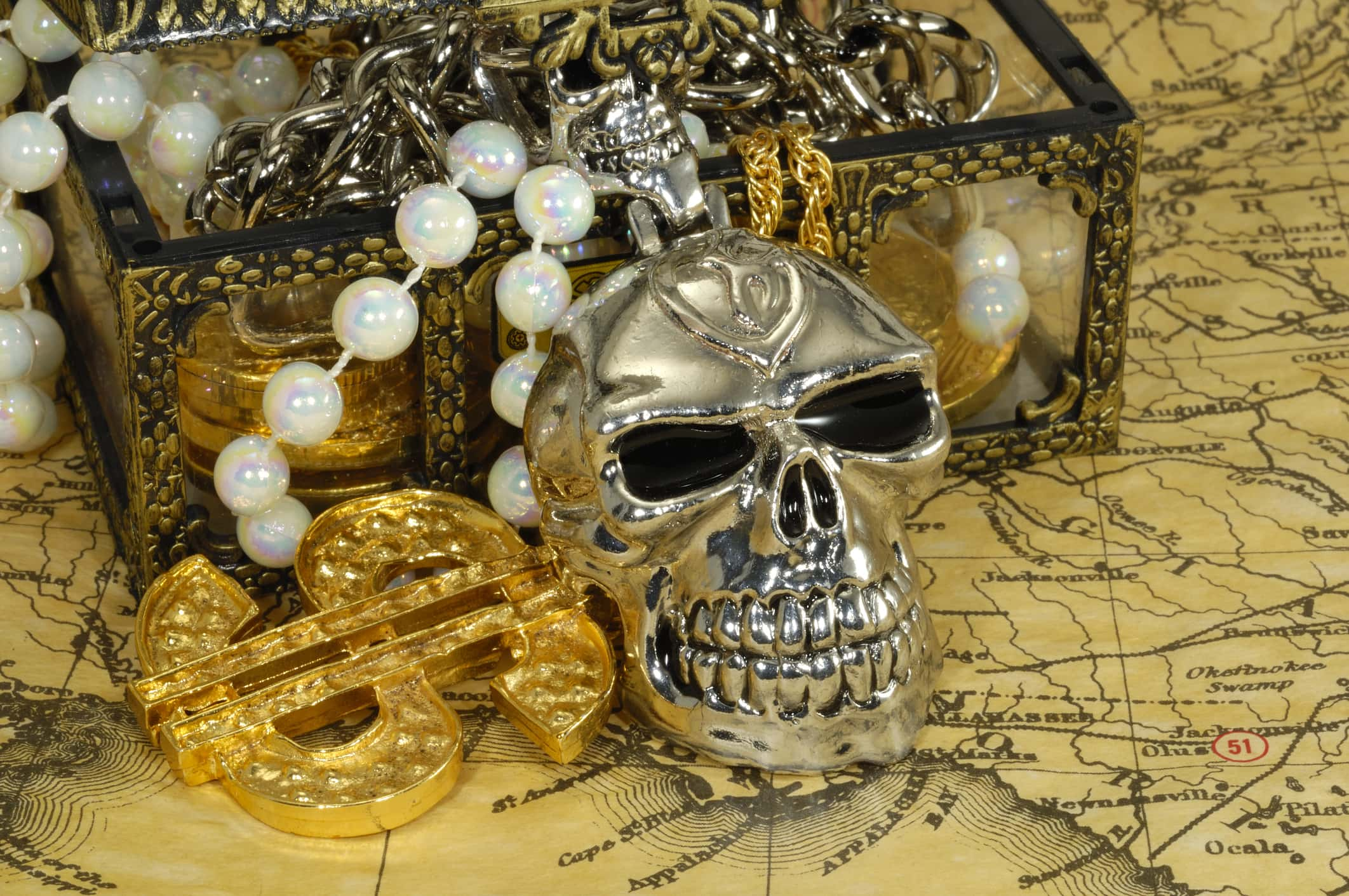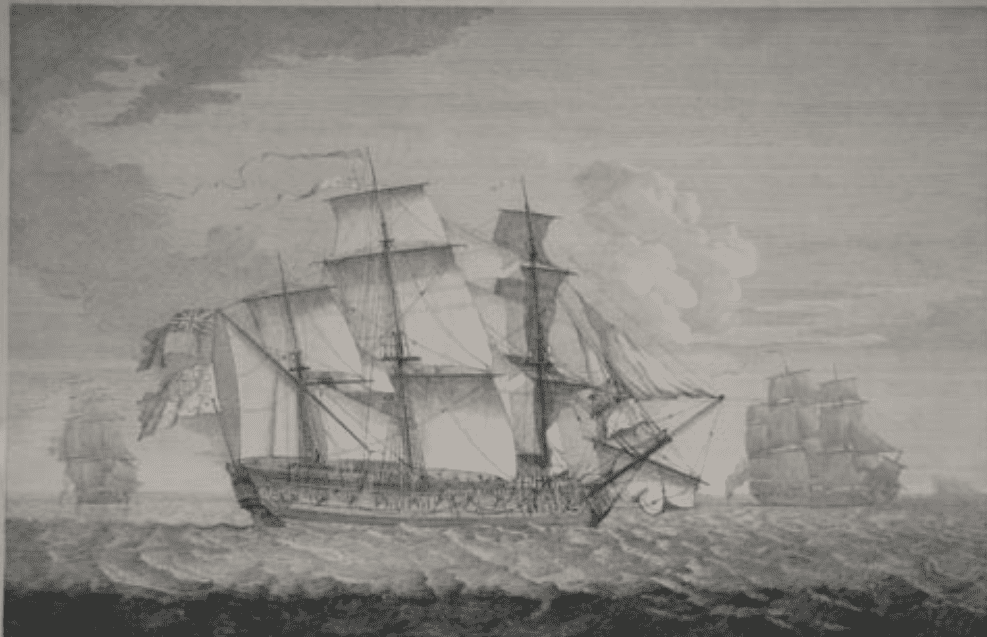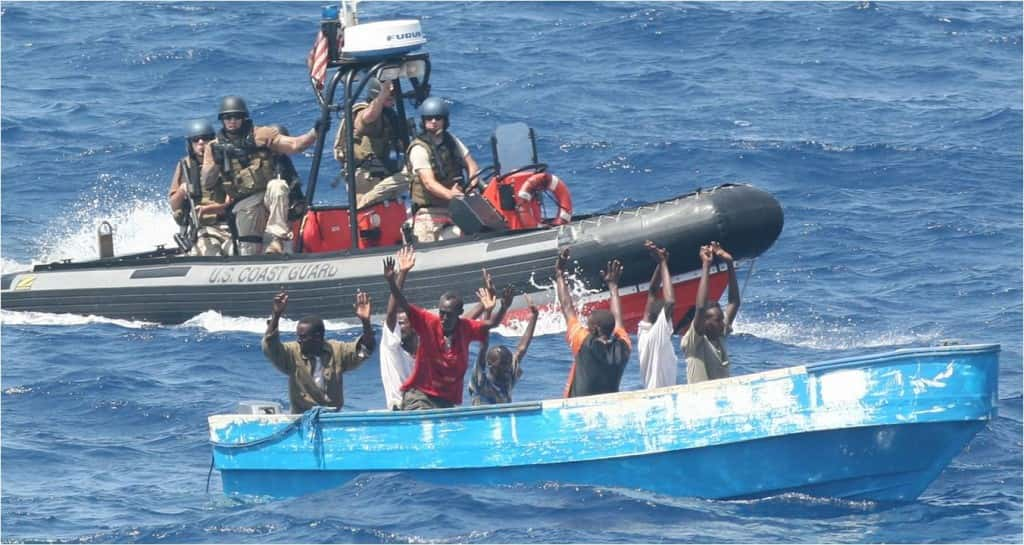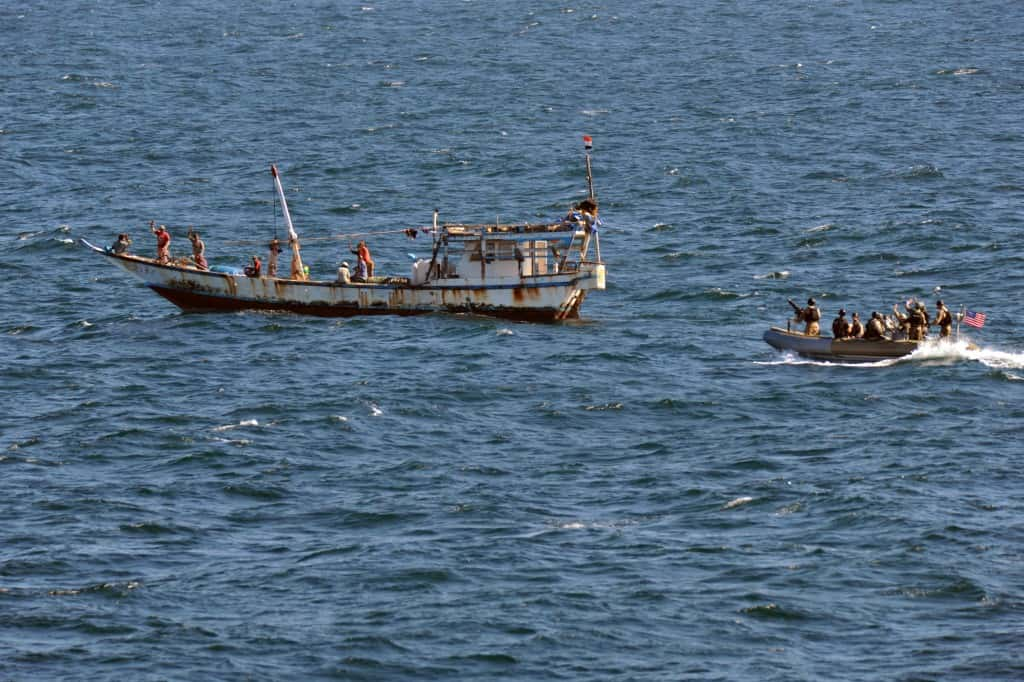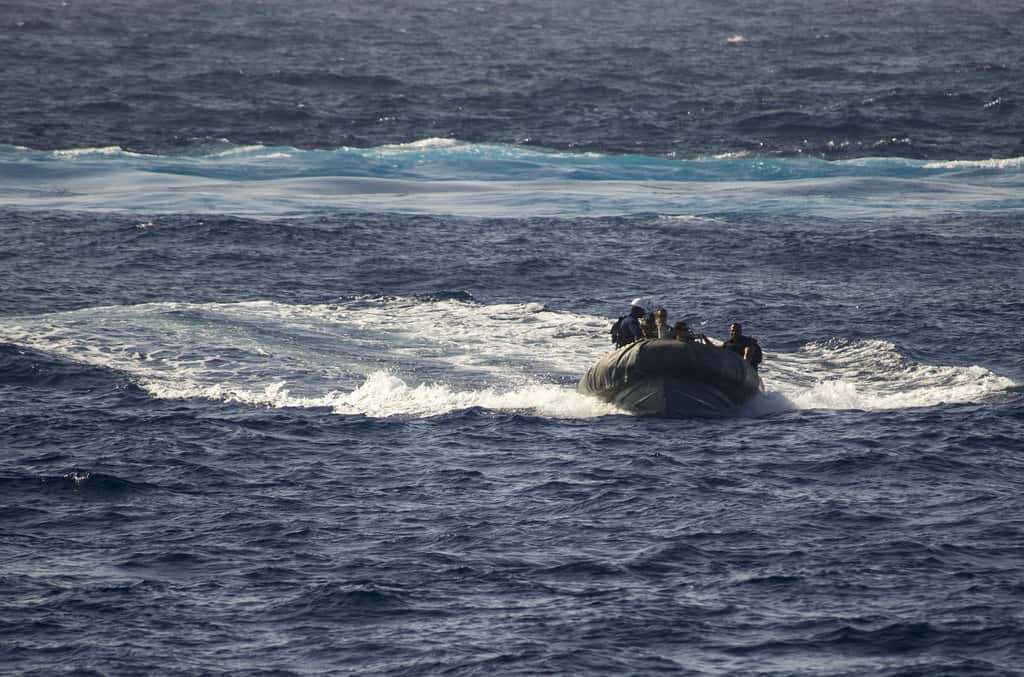39. The Couple That Raids Together
Chinese pirates were a huge problem, with Ching Shih and her husband Zheng Yi commanding tens of thousands of men, enough to combat the Qing Navy.
38. Holy Pirate War!
In the 15th and 16th centuries, there were Muslim pirates known as Barbary corsairs who had a Christian counterpart in the Knights of Saint John. The two sides were described as a “mirror image of maritime predation, two businesslike fleets of plunderers set against each other.”
37. Libertalia or Bust!
In the late 17th century, rumors abounded of a pirate utopia known as Libertalia, an anarchist colony in Madagascar founded by pirates under the leadership of the possibly fictional Captain James Mission. According to legend, Libertalia lasted for about 25 years and its precise location is not known. Unless you play Uncharted IV, which is an awesome game.
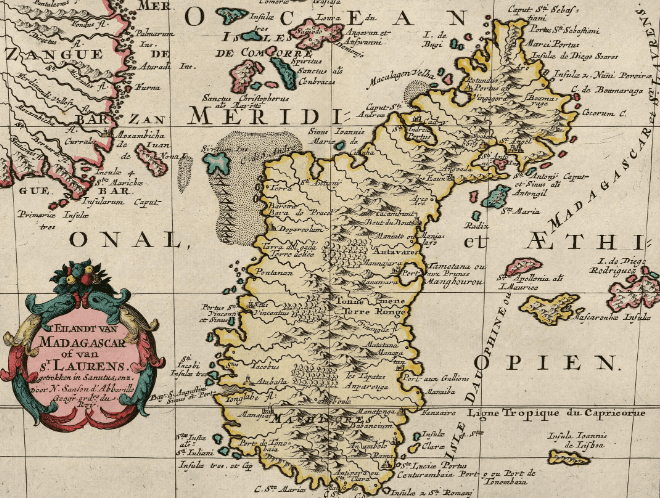 Wikimedia Commons Dutch National Library
Wikimedia Commons Dutch National Library
36. By the Pirates, For the Pirates
Many pirate communities operated as limited democracies, instituting a system of checks and balances similar to the one used by the present-day United States.
35. Ladies of the Golden Age.
Mary Read and Anne Bonny were two of the most famed female pirates of all time; they’re the only two women known to have been convicted of piracy at the height of the Golden Age of Piracy.
34. Jamaican Me Piratey
Spanish anti-pirate ships forced Caribbean buccaneers to move from Hispaniola to Tortuga and the limited resources there forced even more piracy, which was further augmented after the English captured Jamaica from the Spanish and freely granted letters of marque to buccaneers, essentially creating a pirate town.
33. Expansion Pack
Caribbean pirates expanded beyond the Caribbean when an earthquake in 1692 destroyed Port Royal and reduced the attractiveness of the Caribbean as it eliminated the pirates’ chief market for fenced plunder and, at the same time, merchants and governors from largely ignored English colonies such as Bermuda, New York, and Rhode Island funded pirate voyages in the hopes of raising more gold for their provinces.
32. Follow the Money
With the Caribbean dwindling, many pirates started targeting Spain’s Pacific coast colonies as well as the Indian Ocean, which served as passage for high-value luxury goods like silk and calico and the added benefit of not being patrolled by a powerful navy. Really, they were just asking to be robbed.
31. Origin Story
A number of famous pirates came out of this era, including Thomas Tew, Henry Every, Robert Culliford, and William Kidd (who’s identification as a pirate is subject to much controversy).

History's most fascinating stories and darkest secrets, delivered to your inbox daily.
30. Kidding Around
William Kidd, or as he was known, Captain Kidd, was requested by an American governor to attack his fellow pirates, but was himself declared a wanted pirate, an accusation that was confirmed when he took an Indian ship hired by Armenian merchants, which just happened to be captained by an Englishman who held passes promising him protection of the French crown. Though he had been commissioned to take French ships, it didn’t hold up in court and he was summarily executed. He clearly needed a better lawyer.
29. Boredom is the Mother of Bad Behavior
Between 1713 and 1714, a number of peace treaties were signed, which ended the War of the Spanish Succession and left thousands of trained, bored sailors with an itch for seafaring and a need for money. So… blame the Spanish.
28. Founding Fathers
In 1715, pirates launched a major raid on Spanish divers recovering gold from a sunken treasure galleon near Florida. The leaders of the pirate force were Henry Jennings, Charles Vane, Samuel Bellamy, and Edward England, four names that would soon be enshrined in infamy. Upon return to Jamaica, they found that the Governor would not allow them safe harbor so, instead, they founded a new pirate base at Nassau, which would become a home base for many pirates and their recruits…
27. Shoo!
…that is until Woodes Rogers, a former privateer, became the Governor of the Bahamas, and drove out all the pirates. Sort of the way St. Patrick drove out all the snakes. Except Rogers did it with cannons.
26. How Jolly
The origin of the flag's name (Jolly Roger) is lost in time, but one theory is that it stemmed from the name of the red flags used during naval warfare to signal “no mercy,” which were called Joli Rouge (“pretty red”) by the French and that non-French speaking pirates simply butchered the name.
25. The Devil You Say
An alternate theory is that the name originated from a pirate named John Quelch, who had been flying a flag called the “Old Roger” off the coast of Brazil. “Old Roger” was the nickname for the devil. John was the first person to be tried for piracy outside England under Admiralty Law and thus without a jury. He was subsequently hanged.
24. Pirates Unite!
Before the skull and crossbones design was standardized, pirates flew all sorts of flags of their own design, most of which involved symbols of death and various colors. Pirate historians claim that most pirates who were active between 1716 and 1726 were part of two large interconnected groups sharing many similarities. This accounts for the rapid adoption of the skull and crossbones flag amongst many men operating across thousands of miles of ocean.
23. Fire Face
Blackbeard (real name Edward Teach) was one of the most feared pirates of all. Before boarding a ship, he would weave hemp through his beard and light it on fire to intimidate his enemies. Yeah. That’ll do it.
22. Blackbeard: Graphic Designer
Blackbeard flew a flag of his own design, which featured a skeleton with horns against a black background. The skeleton held an hourglass in one hand and carried a spear pointing to a heart dripping with blood. And you thought the flaming beard was scary.
21. Blast from the Past
In 1996, Blackbeard’s ship, the Queen Anne’s Revenge, was found off the coast of North Carolina. Thirty-one cannons and 250,000 artifacts have been recovered. One such artifact was a urethral syringe, which was used to treat syphilis with mercury. Ouch. Plot twist: mercury does not, in fact, cure syphilis.
20. So Literal
The English word “pirate” is derived from the Latin term “pirata” which means sailor or sea robber and from the Greek word “peirates” which literally means “one who attacks ships.” This makes sense, considering they often would attack ships and then rob them.
19. Yo-Ho-Ho…
There were quite a few female pirates as well, including Mary Read, Anne Bonny, Grace O’Malley, and Ching Shih. When it came to gender equality, pirates were way ahead of the game.
18. …and a Bottle of Rum
The pirate’s drink of choice was grog, a mixture of rum, water, lemon juice, and sugar. Sounds like the recipe for a fantastic weekend.
17. iPatch
Pirates actually did have eye patches. One of the reasons given was that pirates wore patches to keep one eye adjusted to night vision for seeing below deck. Also, because they just look cool.
16. A Swift Death
Although walking the plank was common in contemporary pirate lore, most pirates just killed people straight away because they weren’t James Bond villains who gave their enemies a chance to live.
15. Change the Channel
Pirates would often prowl narrow sea channels that funneled shipping into predictable routes. Examples included the waters of Gibraltar, the Strait of Malacca, Madagascar, the Gulf of Aden, and the English Channel.
14. I Keelhaul You!
If pirates wanted to torture their foes, they would drag them from a rope behind the ship (a practice known as keelhauling), strand them on a desert island, or lash them with a whip. Keelhauling was often lethal since the barnacles on the ship's hull would cut the victim.
13. X Marks the Spot
Pirates didn’t always bury their treasure... They often needed money to spend their loot on grog, women, and whatever else it was that pirates liked.
12. Nice Booty
Also, pirate treasure wasn’t always just gold and silver. Most of it was food, lumber, cloth, and animal hides. Y’know, practical stuff.
11. Taking Medicine
In fact, the most highly-prized plunder was medicine. A doctor’s chest would be worth around $470,000 in today’s value.
10. Rules and Regulations
Each pirate ship had its own code of conduct that covered details such as how loot would be divided, who did what chores, and general expectations. One of the most common rules was “no fighting onboard.” If two pirates had a disagreement, they had to wait until they were on land before going at it. Besides, it’s difficult to “step outside” when you’re on a boat.
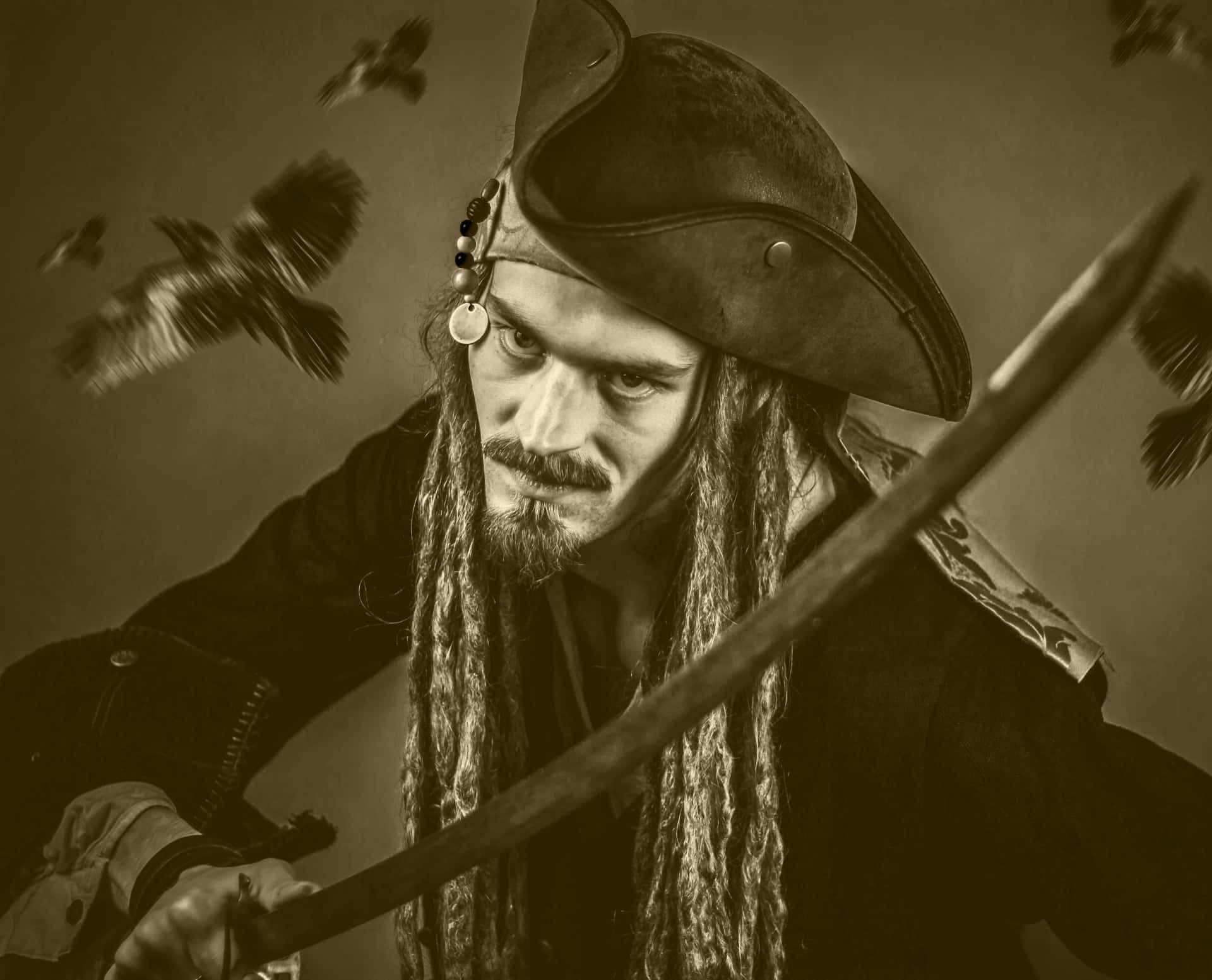 Public Domain Pictures
Public Domain Pictures
9. Loot Bag
Splitting up the loot was fairly egalitarian with most of the crew receiving an equal share with the Captain and commanding officers receiving slightly more as per their agreement. On average, a pirate could expect the equivalent of a year’s wages from each captured ship. Crews of successful pirates would often receive a share valued at $1.17 million at least once in their careers.
8. Big Prize
One of the larger amounts taken from a single ship was that by Captain Thomas Tew from an Indian merchantman in 1692 with each ordinary seaman on his ship receiving a share worth £3,000 ($3.5 million today) and Tew himself receiving 2.5 times that.
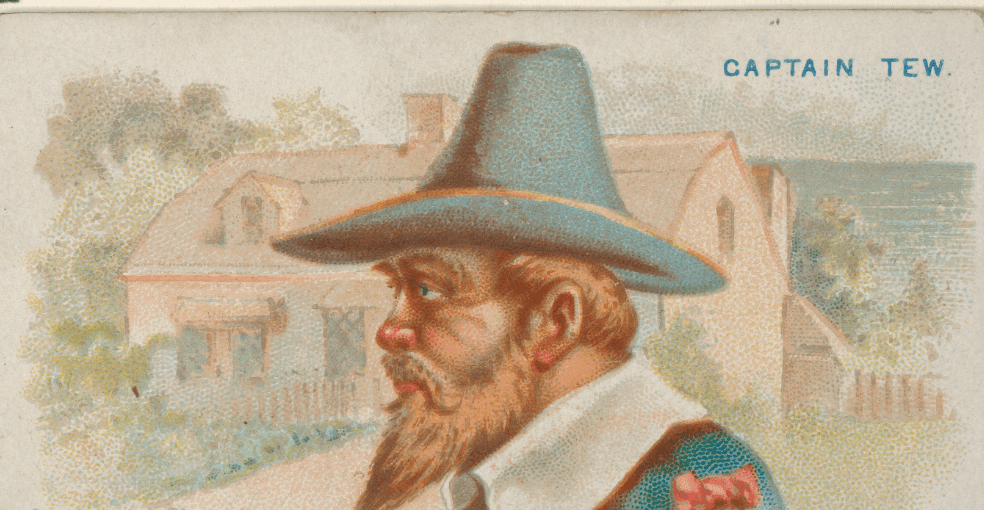 Wikipedia
Wikipedia
7. No Money, Mo Problems
By contrast, an ordinary seamen in the Royal Navy received 19s per month ($580). Not surprisingly, over 42,000 seamen deserted.

6. A Royal Feast
As a way to prevent desertion and increase morale, the Royal Navy changed the rules so that plunder from captured ships went to the captors rather than the Crown. This led to some massive financial windfalls, the biggest of which was the capture of the Spanish frigate Hermione, which resulted in each individual seaman netting £485 ($1.4 million today) with the two responsible captains receiving £65,000 each ($188 million today). Essentially, the Royal Navy legitimized piracy.
5. Pirate love
Pirate mythology paints buccaneers and womanizing, bearded hooligans with a taste for rum. In truth, pirates welcomed homosexuality and even had their own form of gay marriage. Matelotage was a civil partnership between two male pirates. Matelotage partners openly had sex with each other, shared their property, and lived together.
4. Well, Not All Love Is Welcome Aboard
Pirate code decreed that any man found “seducing one of the latter sex and carrying her to sea in disguise, he shall suffer death.” Desertion was also punishable by death.
3. Same Idea, Bigger Guns
Piracy remains a huge problem in the 21st century, with modern-day pirates armed with rockets and machine guns using small motorboats to attack and board cargo ships.
2. I Am the Captain Now
Somalian pirates are amongst the most notorious of the modern-day pirates, prowling the waters in the Gulf of Aden. Many Somalis were forced into piracy when illegal fishing by foreign vessels and the offshore dumping of toxic waste by international conglomerates heavily depleted the fishstock in Somali waters.
1. That’s what Insurance is for
Estimates are that modern-day piracy has resulted in worldwide losses of US$16 billion per year.

